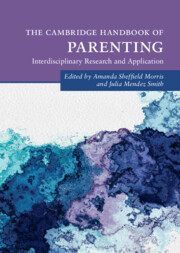Book contents
- The Cambridge Handbook of Parenting
- Cambridge Handbooks in Psychology
- The Cambridge Handbook of Parenting
- Copyright page
- Dedication
- Contents
- Contributors
- Figures
- Tables
- Introduction
- Part I Foundations of Parenting
- Part II Parenting across Development: Social, Emotional, and Cognitive Influences
- Part III Parental Factors That Impact Parenting
- Part IV Child Factors that Impact Parenting
- 17 Parenting Children with Disabilities
- 18 Parenting Children with Externalizing Behavior and ADHD
- 19 Parenting in the Context of Child Anxiety and Depression
- 20 Parenting LGBTQ Children and Adolescents
- 21 Parenting Children with a History of Adversity
- Part V Parent Education, Intervention and Policy
- Index
- References
18 - Parenting Children with Externalizing Behavior and ADHD
from Part IV - Child Factors that Impact Parenting
Published online by Cambridge University Press: 01 December 2022
- The Cambridge Handbook of Parenting
- Cambridge Handbooks in Psychology
- The Cambridge Handbook of Parenting
- Copyright page
- Dedication
- Contents
- Contributors
- Figures
- Tables
- Introduction
- Part I Foundations of Parenting
- Part II Parenting across Development: Social, Emotional, and Cognitive Influences
- Part III Parental Factors That Impact Parenting
- Part IV Child Factors that Impact Parenting
- 17 Parenting Children with Disabilities
- 18 Parenting Children with Externalizing Behavior and ADHD
- 19 Parenting in the Context of Child Anxiety and Depression
- 20 Parenting LGBTQ Children and Adolescents
- 21 Parenting Children with a History of Adversity
- Part V Parent Education, Intervention and Policy
- Index
- References
Summary
Families of youth with ADHD and externalizing disorders experience significant disruption to parent-child interactions that results in considerable familial stress, low parental self-efficacy, and parental affiliation stigma. Coercive interaction patterns characterized by parents and children using aversive behaviors to control the behavior of family members are theorized to be the mechanism behind increasing escalation of children’s externalizing behaviors. As a result, children with ADHD and externalizing conditions are at higher than average risk for academic and/or social impairment into adulthood. Cultural differences in perceptions and responses to children’s externalizing behavior play an important role in how these behaviors manifest across development as well as regarding the severity of problematic outcomes. Although mothers and other caregivers (e.g., fathers, grandparents) may show differences in perceptions and responses to child externalizing behaviors, those who play primary disciplinary roles are most likely to engage in coercive interactions and experience stress related to being a parent. Etiological studies indicate externalizing behaviors are best viewed as resulting from an interaction between neurobiology and environmental influences with the latter (particularly coercive interaction patterns) playing a predominant role in development of child defiance and aggression. Thus, treatment necessarily focuses on disrupting coercive interaction patterns wherein parents use behavioral strategies including preventive, instructive, and responsive techniques to encourage, reinforce, and support children in better behavioral and emotional regulation. Given the myriad manifestations of externalizing behaviors across time and settings, parenting interventions are one important piece of a larger multi-component treatment program.
- Type
- Chapter
- Information
- The Cambridge Handbook of Parenting , pp. 403 - 424Publisher: Cambridge University PressPrint publication year: 2022

